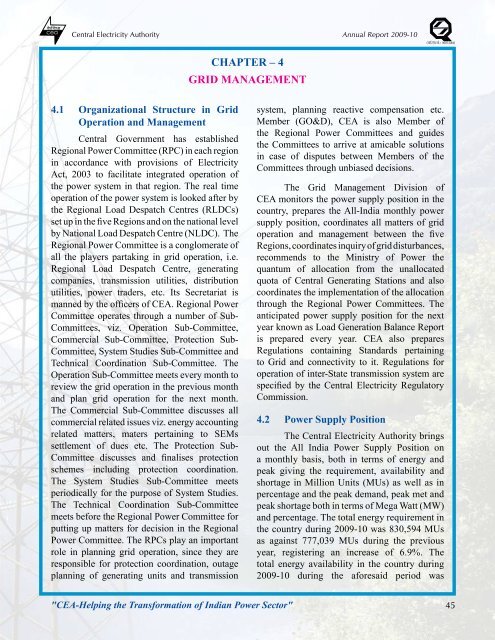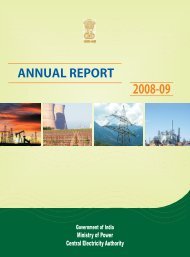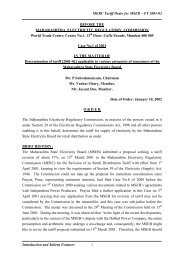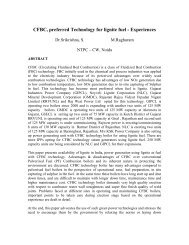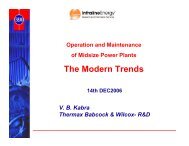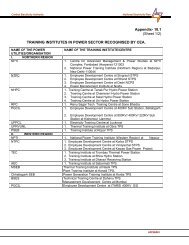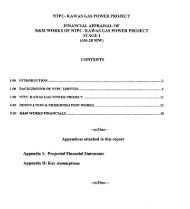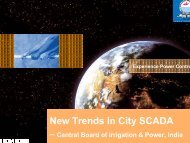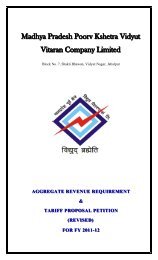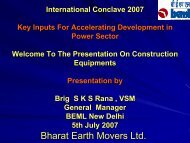thermal power development - Infraline
thermal power development - Infraline
thermal power development - Infraline
Create successful ePaper yourself
Turn your PDF publications into a flip-book with our unique Google optimized e-Paper software.
Central electricity authority Annual Report 2009-10<br />
CHAPTER – 4<br />
GRID MANAGEMENT<br />
4.1 Organizational Structure in Grid<br />
Operation and Management<br />
Central Government has established<br />
Regional Power Committee (RPC) in each region<br />
in accordance with provisions of Electricity<br />
Act, 2003 to facilitate integrated operation of<br />
the <strong>power</strong> system in that region. The real time<br />
operation of the <strong>power</strong> system is looked after by<br />
the Regional Load Despatch Centres (RLDCs)<br />
set up in the five Regions and on the national level<br />
by National Load Despatch Centre (NLDC). The<br />
Regional Power Committee is a conglomerate of<br />
all the players partaking in grid operation, i.e.<br />
Regional Load Despatch Centre, generating<br />
companies, transmission utilities, distribution<br />
utilities, <strong>power</strong> traders, etc. Its Secretariat is<br />
manned by the officers of CEA. Regional Power<br />
Committee operates through a number of Sub-<br />
Committees, viz. Operation Sub-Committee,<br />
Commercial Sub-Committee, Protection Sub-<br />
Committee, System Studies Sub-Committee and<br />
Technical Coordination Sub-Committee. The<br />
Operation Sub-Committee meets every month to<br />
review the grid operation in the previous month<br />
and plan grid operation for the next month.<br />
The Commercial Sub-Committee discusses all<br />
commercial related issues viz. energy accounting<br />
related matters, maters pertaining to SEMs<br />
settlement of dues etc. The Protection Sub-<br />
Committee discusses and finalises protection<br />
schemes including protection coordination.<br />
The System Studies Sub-Committee meets<br />
periodically for the purpose of System Studies.<br />
The Technical Coordination Sub-Committee<br />
meets before the Regional Power Committee for<br />
putting up matters for decision in the Regional<br />
Power Committee. The RPCs play an important<br />
role in planning grid operation, since they are<br />
responsible for protection coordination, outage<br />
planning of generating units and transmission<br />
system, planning reactive compensation etc.<br />
Member (GO&D), CEA is also Member of<br />
the Regional Power Committees and guides<br />
the Committees to arrive at amicable solutions<br />
in case of disputes between Members of the<br />
Committees through unbiased decisions.<br />
The Grid Management Division of<br />
CEA monitors the <strong>power</strong> supply position in the<br />
country, prepares the All-India monthly <strong>power</strong><br />
supply position, coordinates all matters of grid<br />
operation and management between the five<br />
Regions, coordinates inquiry of grid disturbances,<br />
recommends to the Ministry of Power the<br />
quantum of allocation from the unallocated<br />
quota of Central Generating Stations and also<br />
coordinates the implementation of the allocation<br />
through the Regional Power Committees. The<br />
anticipated <strong>power</strong> supply position for the next<br />
year known as Load Generation Balance Report<br />
is prepared every year. CEA also prepares<br />
Regulations containing Standards pertaining<br />
to Grid and connectivity to it. Regulations for<br />
operation of inter-State transmission system are<br />
specified by the Central Electricity Regulatory<br />
Commission.<br />
4.2 Power Supply Position<br />
The Central Electricity Authority brings<br />
out the All India Power Supply Position on<br />
a monthly basis, both in terms of energy and<br />
peak giving the requirement, availability and<br />
shortage in Million Units (MUs) as well as in<br />
percentage and the peak demand, peak met and<br />
peak shortage both in terms of Mega Watt (MW)<br />
and percentage. The total energy requirement in<br />
the country during 2009-10 was 830,594 MUs<br />
as against 777,039 MUs during the previous<br />
year, registering an increase of 6.9%. The<br />
total energy availability in the country during<br />
2009-10 during the aforesaid period was<br />
"CEA-Helping the Transformation of Indian Power Sector"<br />
45


